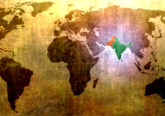 For three days (February 3-5) Oxford University was the venue for the Pakistan Future Leaders’ Conference (PFLC), attended by some 300 student-delegates hailing from around 50 universities and colleges in the United Kingdom. This major event was organised by Oxford University’s Pakistan Society, in collaboration with the Oxford Union, and the Pakistan societies of Cambridge University and the School of Oriental and African Studies.
For three days (February 3-5) Oxford University was the venue for the Pakistan Future Leaders’ Conference (PFLC), attended by some 300 student-delegates hailing from around 50 universities and colleges in the United Kingdom. This major event was organised by Oxford University’s Pakistan Society, in collaboration with the Oxford Union, and the Pakistan societies of Cambridge University and the School of Oriental and African Studies.
Such a large gathering of young Pakistanis in Oxford was reflective of an emerging ‘youth moment’ currently setting the course of politics in Pakistan. Cricketer-turned-politician Imran Khan, who is also an Oxonian, has already tapped into this phenomenon. His recent political rallies in Lahore and Karachi attracted exceptionally large crowds of younger people, forcing the country’s mainstream politicians in government and opposition to make their own countervailing moves to lure the youth.
The bulk of Pakistan’s population is aged between 18 and 30, and it aspires for a national revolution on the pattern of the Arab Spring. Pakistani or Pakistan-origin British students enrolled in various UK universities are already proactively engaged in social media debates for this purpose. Just as before, it is from this youth that some of the country’s leaders of tomorrow may emerge.
As for events such as PFLC, what is discussed or concluded may not directly impact Pakistan’s current politics, but its intrinsic value in shaping the country’s future political course cannot be ruled out. What was quite promising about this particular conference was the willingness of its young participants to rationally debate Pakistan’s key domestic and foreign policy challenges, and explore possible opportunities and solutions for tackling them effectively.
The delegates were divided into different committees, which dealt with subjects ranging from internal affairs to foreign affairs, as well as law, finance, education, health and environment. Representative delegates chaired the committee proceedings, and subject experts were also present to share their thoughts.
After extensively debating the issues for two days, each committee approved a number of resolutions, which were again voted upon in a joint session of the student delegates during the third day of the conference.
What do young Pakistanis studying in British universities want to happen in Pakistani politics? And, what do they substantively propose to solve the myriad problems afflicting their homeland? PFLC’s various issues-specific committee deliberations and resolutions may provide an answer.
Take, for instance, the Internal Affairs Committee, which covered subjects ranging from democracy to religious extremism and terrorism, to insurgency in the province of Balochistan. Its delegates termed the continuity of democratic process led by mainstream national and regional parties, without interference by the army and interruption by the judiciary, as crucial for the country’s political stability. Stabilisation of the national policy was, in turn, regarded as the main pre-requisite for tacking the challenges of extremism and insurgency.
In the Foreign Affairs Committee, which I attended as an expert, the student debate focused on Pakistan’s relations with the US, Afghanistan and India. Another controversial issue, Pakistan’s policy towards Israel, also came up for discussion, and consensus was, indeed, achieved on the subject during the committee proceedings. However, the joint session of the delegates later decided not to approve the resolution concerned.
Interestingly, the committee’s two other resolutions, one on Pakistan’s relations with the US and Afghanistan, and the other concerning its ties with India, seemed to be motivated by a consensual stand: that regional conflict was not in Pakistan’s favour. Regarding the US and Afghanistan, it was proposed that the country’s role should be to facilitate the smooth withdrawal of US and NATO forces from Afghanistan. Its support to an Afghan-led reconciliation process was identified as an essential pre-requisite in this regard.
As for Pakistan’s relations with India, the need to recognise their traditionally conflicting course was emphasized—which, in the view of committee delegates, necessitates that Islamabad should pursue a cooperative path in its ties with New Delhi. Inter-media groups such as Aman Ki Asha and other civil society initiatives were identified as important Confidence-Building Measures between the two countries. The resolution called for greater people-to-people interaction and more progress in bilateral trade.
The resolutions of the Finance Committee centred on the requirement for a national economy that is driven by international trade rather than foreign aid. Accordingly, the trade policy had to be reformed in a way that the current policy of exporting mostly raw materials should eventually give way to a new approach of exporting value added items. It is, therefore, imperative to overcome the energy crisis by immediately tackling the issue of ‘circular debt’ and exploring alternative means of energy generation in the long run.
Taxation, including the imposition of wealth and agriculture tax, and land reforms were identified as two essential options for generating revenue to overcome energy crisis. The consequent industrialisation process could boost value-added exports, thereby enabling Pakistan to compete effectively in regional and global consumer markets. The reduction of defence expenditure and its parliamentary scrutiny were identified as additional means for ensuring greater national spending on developmental sectors, such as education and health.
The Legal Affairs Committee resolved to reform the current blasphemy law, which holds the accused guilty merely on the basis of an alleged blasphemous act. Whether the accused intended to engage in blasphemy is an issue that the current law does not cover. Nor does it include any provision about instances of blasphemy pertaining to faiths other than Islam. Given that, the committee recommended that the blasphemy law that had been in place prior to General Zia’s regime (and was inclusive of the afore-mentioned provisions) should be re-enacted.
The Education Committee reiterated what has been a long-standing concern of the country’s liberal community: revising the curriculum of state school textbooks on Pakistan Studies, which glorify Muslim warriors and portray India as ‘Hindu’ and Hindu as ‘the other’. Projecting hatred against India through education, including the role of popular media in the process, also emerged as a major issue of concern during the Foreign Affairs Committee’s deliberations on relations with India.
Given that, the need on the part of the governments and medias of both countries to reform their respective hostile approaches was underlined. The Education Committee, as well as Finance Committee, also resolved that Pakistan needed to spend more on education, or, at least, as much as other countries in South Asia do. In the former’s view, the country was facing the ‘education emergency’, requiring emergency response from the government.
The committees on health and environment likewise resolved that the solution to Pakistan’s problems in the two fields required significant increase in the country’s development expenditure. They additionally recommended the establishment of a number of provincial, and inter-provincial or federal level institutional mechanisms to solve the aggravating health and environment challenges facing Pakistan.
PFLC concluded on the third day with a TV debate—broadcast by Pakistan’s leading Urdu news channel, GEO TV—during which prominent national leaders, including lawyer Asma Jahangir, and politicians Serdar Assef Ahmed Ali and Dr Farooq Satter faced student-delegates representing their respective committees. The event took place in the historic Oxford Union, which has a sizeable portrait of late Benazir Bhutto hanging on its wall, in recognition of her being the first woman President of the Union.
In the lively debate that concluded the conference, there was little disagreement between young delegates and senior dignitaries about the urgent need for re-charting Pakistan’s political course so as to realise the long-cherished aspirations of its people. Unsurprisingly, though, the most distinct element of the event was the general desire for political change in Pakistan – a visible and encouraging theme shared by future leaders.
The author is the Quaid-i-Azam Fellow at St Antony’s College, University of Oxford.






1 Comment
A number of very interesting recommendations seem to have come out of this conference. Such initiatives should be applauded and I congratulate Oxford University Pakistan Society and other organizers for taking the initiative. However I have my reservations on these suggestions being taken seriously by those at the helm of affairs in Pakistan, including not only the Government but also other institutions. There is much need for all organs of the state to gather under one roof and come up with a minimum common agenda on which every one agrees to steer the country for the next 20 years. Whether such consensus can be reached will in my view determine the fate of the country.